Click on images to enlarge
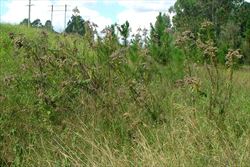
infestation (Photo: Sheldon Navie)
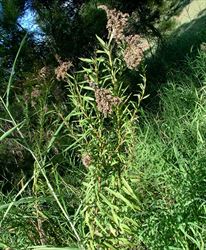
habit in fruit (Photo: Sheldon Navie)
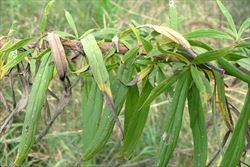
older leaves (Photo: Sheldon Navie)
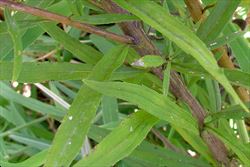
close-up of stem and leaves with slightly-toothed margins (Photo: Sheldon Navie)
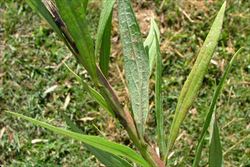
close-up of roughly hairy leaf undersides (Photo: Sheldon Navie)

large branched cluster of small yellow flower-heads (Photo: Sheldon Navie)
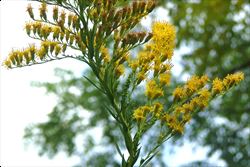
close-up of flower-heads (Photo: Sheldon Navie)
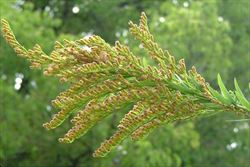
immature fruit (Photo: Sheldon Navie)

large branched cluster of mature fruit (Photo: Sheldon Navie)

mature fruit with fluffy seeds (Photo: Sheldon Navie)
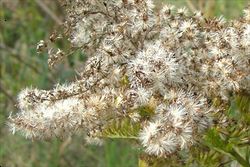
close-up of fluffy seeds (Photo: Sheldon Navie)
Scientific Name
Solidago altissima L. subsp. altissima
Synonyms
Solidago canadensis L.
Solidago lepida DC. var. elongata (Nutt.) Fernald (misapplied)
Family
Asteraceae
Common Names
American goldenrod, Canada goldenrod, Canadian goldenrod, common golden-rod, common goldenrod, golden rod, goldenrod, tall goldenrod
Origin
Native to eastern Canada and eastern USA.
Naturalised Distribution
Widely naturalised in southern and eastern Australia (i.e. in the coastal districts of Queensland, in some parts of central and northern New South Wales, in south-eastern South Australia, and in the coastal districts of south-western, north-western and southern Western Australia).
Also naturalised on Lord Howe Island and sparingly naturalised in Victoria.
Legislation
This species is not not currently declared under state legislation in Queensland. However, it has been declared as a Class C Noxious Weed by the Brisbane City Council, because it is toxic to animals or humans. The control objective for Class C Noxious Weeds is containment and reduction, as eradication is not a viable option (i.e. infestations are to be contained and further spread prevented, while the overall size of infestations is to be reduced).
Management
As this species is not a state declared plant, its control is usually not required by law. However, it is an environmental weed and should be managed in sensitive bushland and conservation areas.
Notes
Canadian goldenrod (Solidago canadensis var. scabra) is regarded as an environmental weed in Queensland and New South Wales, and as a minor or potential environmental weed in Victoria.

